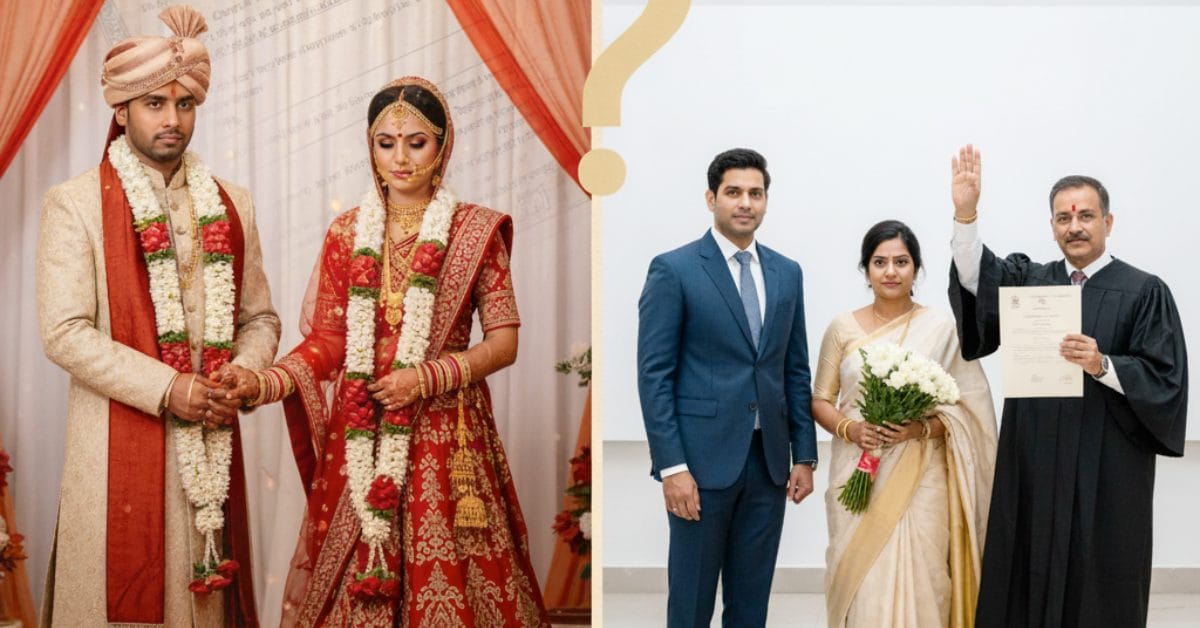Is Second Marriage Possible Without Divorce: Rules & Exceptional Cases
The short answer to this critical question is no – a second marriage without obtaining a divorce is illegal in India and is treated as the criminal offense of bigamy under Indian law.
However, there is an exception under Muslim personal law, which permits a man to have up to four wives at the same time, but only under strict conditions laid down by Islamic law.
As a divorce advocate with over 21 years of experience at Bhatla Law Firm, I’ve witnessed countless cases where individuals unknowingly walked into legal trouble by pursuing second marriages without properly dissolving their first.
In my practice, I’ve seen how this confusion arises from misconceptions about separation versus divorce. Many couples believe that living separately for years equals divorce, but this is far from legal reality.

The Harsh Legal Truth About Second Marriage Without Divorce
Bigamy is a serious criminal offense under Indian law. Section 494 of the Indian Penal Code explicitly states that marrying again during the lifetime of your spouse, without obtaining legal divorce, is punishable with imprisonment of up to 7 years and fine.
If you conceal your first marriage from your second spouse, the punishment increases to up to 10 years imprisonment under Section 495.
The Hindu Marriage Act of 1955 makes it crystal clear through Section 5(i) that neither party should have a living spouse at the time of marriage. Any violation of this condition renders the second marriage void under Section 11 of the Act.
Religious Exceptions and Their Limits
While Muslim personal law permits a man to have up to four wives simultaneously, this comes with strict conditions under Islamic law. However, this exception doesn’t apply to Hindus, Christians, Sikhs, Buddhists, Jains, or Parsis, who are bound by monogamous marriage laws.
Interestingly, data from the National Family Health Survey-5 reveals that only 1.4% of married Indian women reported their husbands having multiple wives, with the practice being more common among tribal communities (2.4%) than among Muslims (1.9%) or Hindus (1.3%).
Legal Consequences of Second Marriage without Divorce
In my two decades of practice, I’ve handled numerous bigamy cases. The consequences extend far beyond imprisonment:
For the First Spouse:
- Retains full legal rights including maintenance, property rights, and child custody
- Can file criminal complaint under Section 494/495 IPC
- Entitled to seek divorce on grounds of adultery or cruelty
For the Second Spouse:
- Marriage is completely void and has no legal recognition
- No inheritance rights or claim to husband’s property
- Cannot seek maintenance as a “wife” (though exceptions exist under Section 125 CrPC in certain cases)
- May face social stigma and legal complications
For Children from Second Marriage:
- Despite the marriage being void, children born from such unions have full legal rights including inheritance under Section 16 of the Hindu Marriage Act.

When Second Marriage Becomes Legal
There are only specific circumstances where remarrying becomes legally permissible:
- After obtaining a legal divorce decree from competent court
- Death of the first spouse
- If the first marriage is declared void by court
- Seven years of continuous absence of spouse without any information about being alive (Section 494 Exception)
The Separation Myth That Destroys Lives
One of the most dangerous misconceptions I encounter is couples believing that living separately equals divorce. Let me be absolutely clear – separation is NOT divorce. No matter how many years you’ve lived apart, your first marriage remains legally valid until dissolved by a competent court.
This misunderstanding has led to numerous legal disasters in my practice, where well-meaning individuals faced criminal charges for bigamy.
Protecting Yourself: Legal Steps to Take
If you’re considering remarriage:
- Obtain proper divorce decree from family court
- Ensure all legal formalities are completed
- Maintain all court documents as proof
- Consult experienced matrimonial lawyers throughout the process
- Never rely on verbal assurances from anyone
Expert Legal Guidance Matters
The complexity of matrimonial law demands professional expertise. At Bhatla Law Firm, Advocate Kamal Bhatla personally handles each case with complete confidentiality and dedication. With 21 years of courtroom experience, we know that every case is unique and needs a personalized legal strategy.
Whether you require mutual consent divorce, contested divorce proceedings, or protection from bigamy charges, our experienced team offers honest counsel and robust representation.
When you come to us with second marriage dilemmas, this is how we proceed:
- Immediate legal assessment of your current marital status
- Filing for a proper divorce if reconciliation isn’t possible
- Protecting clients from criminal liability
- Ensuring full compliance with all legal requirements
Contact Us!
Phone: +91-9899004529
Email: info@bhatlalawfirm.com
Offices:
- Chamber No. 442, Patiala House Courts Complex, New Delhi, 110001
- 581, 3rd Floor, Gali No. 21, Shiv Nagar, Janakpuri
- CH 841, Dwarka Courts Complex
- Ch B/342, Gurugram District Court
Conclusion
The desire for companionship and happiness is natural, but illegal second marriages create more problems than they solve. The legal, social, and emotional consequences can devastate multiple lives – yours, your spouses, and your children’s.
India’s legal system provides clear pathways for dissolving unsuccessful marriages. Use them. The temporary inconvenience of proper legal proceedings is nothing compared to years of criminal liability and social complications.
As someone who has witnessed the aftermath of illegal second marriages, I cannot emphasize enough: there are no shortcuts in matrimonial law. Protect yourself, your loved ones, and your future by choosing the legal path.
For expert guidance on divorce proceedings and matrimonial matters, contact Bhatla Law Firm. Our experienced legal team ensures your rights are protected while navigating complex family law situations with complete confidentiality and care.
Disclaimer: This article represents general legal information and should not be considered as specific legal advice for individual cases. Always consult qualified legal professionals for your specific situation.

